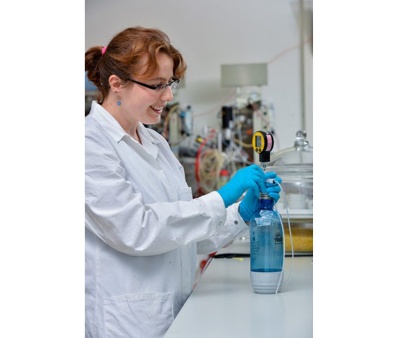Elisabeth Anne Cazier
Research topics and role within SCCER
Dr. Elisabeth Anne Cazier is a post-doctoral researcher at Bern University of Applied Sciences. She works on the use of fermentation or anaerobic digestion of bio-waste to produce methane, chemical molecules or energy. Her particular research field is the use of pretreatments to improve the production of methane from agricultural waste. Elisabeth values the exchange with other researchers within the SCCER BIOSWEET, ‘I am keen on participating to the SCCER BIOSWEET events since it is interesting to know what is happening outside of my field’, she says.
Biography, carrier path
I graduated as an engineer with a master of science in food industry, specializing in microbiology from AgroParisTech in France. After internships at Mc Gill University in Canada and IRSTEA Antony in France, I did a PhD in biotechnology and microbiology at the Laboratoire de Biotechnologie de l’Environnement at Narbonne. My thesis was on the ‘Impact of dissolved gases on dry anaerobic digestion of lignocellulosic residues’.
I worked for one year in a KTP (Knowledge transfer partnership: a joint venture between Academia and Industry) project with Plymouth’s university in the UK and a start-up called New Generation Biogas, on improving the knowledge at microorganism level to optimize the industrial process. I came to Switzerland in 2017 to work at the Berner Fachhochschule on pretreatments to improve the production of methane from agricultural waste.
What do you find fascinating about the energy transition?
For me, the energy transition is something that is urgent and really needed. Every day we hear about climate changes and its effects on the world. It is alarming. For me, it is even more important to work on how we use energy and other resources. We really need to rethink how the western societies are going to decrease for example the quantity of energy and water we use or the quantity of waste produce and increase their recycling. The whole agricultural processes should also evolve to decrease their impact on the world (energy, water, pesticides) and still be profitable for the farmers. For example, there is currently a project called Urbainculteurs in Canada, to promote urban farming. It is a small project but it has been going on for the last seven years. We need to think outside of the box! For me, there is no global solution but smaller initiatives.
To come back to the energy transition, it is difficult sometimes to translate what you find in your laboratory at small scale to industry scale, and also to show that is still profitable at a bigger scale. It is good to have association or groups to connect industry and research. Also, one of the biggest problems for the energy transition is the reduction of the money available for research, at last in some countries which induce the researchers to provide fast answers when sometimes fundamental research is also needed.
One of the points I like in energy transition is that it is very diverse in research fields, in innovative ideas or even in solutions. Collaborations between people across countries, research fields and cultures are needed.
Renewable energy will increase during the next 10 years with a lot more anaerobic digesters for bio-waste, wind and sun power. I also think that we will see the increase of small initiatives (at people, village and regional scale), and different solution for each country. Renewable energy needs to be flexible to answer to different needs and local conditions.
Recommendations for young women wishing to pursue a career in the energy field?
Be curious and keep an open mind. If you are interested or puzzled by something, research it. For the girls (and the boys too…), it is also good not to let yourself be influenced by society opinions. It is also good to discuss with other people to know what is happening in other fields or to keep contacts. Do not get discouraged by failure but learn from them. It is also necessary to appreciate your job since you are going to spend most of your time working.
Your „work-balance“ recipe?
I think the most important is putting boundaries and sticking to them. It is sometimes difficult when you do biology research since the microorganisms grow when they want and ideas can arrive at any time. For me, I really try to disconnect from work when I am at home or on holiday. I think it is also necessary to have an activity completely separate from work. For me, it is karate and friends.
Interview: Simone Nanzer (SCCER BIOSWEET), July 2017
!!! This document is stored in the ETH Web archive and is no longer maintained !!!
